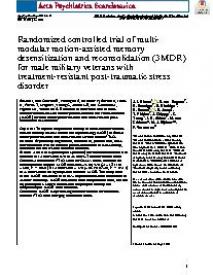Randomised controlled trial of multi-modular motion-assisted memory desensitisation and reconsolidation (3MDR) for male military veterans with treatment-resistant post-traumatic stress disorder
Objective
To explore the potential efficacy of multi-modular motion-assisted memory desensitisation and
reprocessing (3MDR) in British military veterans with treatment-resistant, service-related PTSD.
Methods
Exploratory single-blind, randomised, parallel arm, cross-over controlled trial with nested process
evaluation to assess fidelity, adherence and factors that influence outcome.
Results
42 participants (all male) were randomised with 83% retention at 12 weeks and 86% at 26 weeks. The difference in mean Clinician Administered PTSD Scale for DSM-5 scores between the immediate and delayed 3MDR arms was -9.38 (95% CI -17.33 to -1.44, p = 0.021) at 12 weeks and -3.59 (-14.39 to 7.20, p=0.513) at 26 weeks when both groups had received 3MDR. The likely effect size of 3MDR was found to be 0.65. Improvements were maintained at 26 week follow-up. 3MDR was found to be acceptable to most, but not all, participants. Several factors that may impact efficacy and acceptability of 3MDR were identified.
Conclusion
3MDR is a promising new intervention for treatment-resistant PTSD with emerging evidence of
effect.
Trial Registration Number – ISRCTN80028105
Geachte bezoeker,
De informatie die u nu opvraagt, kan door psychotraumanet niet aan u worden getoond. Dit kan verschillende redenen hebben,
waarvan (bescherming van het) auteursrecht de meeste voorkomende is. Wanneer het mogelijk is om u door te verwijzen naar de bron
van deze informatie, dan ziet u hier onder een link naar die plek.
Als er geen link staat, kunt u contact opnemen met de bibliotheek,
die u verder op weg kan helpen.
Met vriendelijke groet,
Het psychotraumanet-team.
In: Acta Psychiatria Sandinavia ; ISSN:1600-0447 | june
https://doi.org/10.1111/acps.13200
Epub ahead of print DOI : 10.1111/acps.13200


